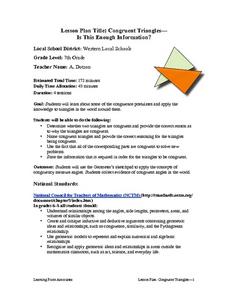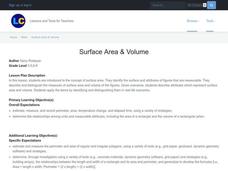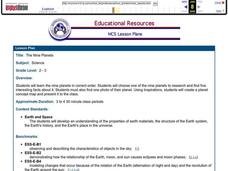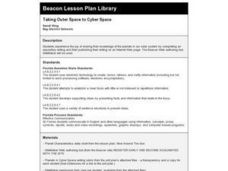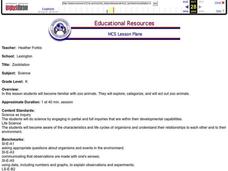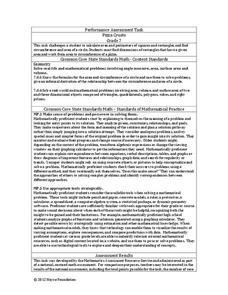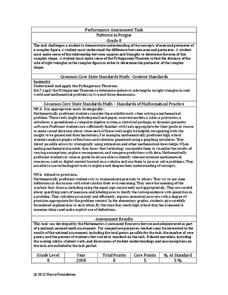Curated OER
Simple Machines - Graphics, Experiments, Animation
Twelfth graders display simple machines through the use of graphics, experiments, and animation. They apply problem solving and design and skills.
Curated OER
Congruent Trianges - Is This Enough Information?
Seventh graders determine whether two triangles are congruent and provide an explanation to why they are not. They apply concepts of measurement of angles and collect evidence of congruent angles in the world.
Curated OER
From Here to Technology
Middle schoolers, while in the computer lab, create a slide on an assigned topic that becomes part of a class presentation. They trace the evolution of the computer and identify the pioneers of technology and investigate the impact that...
Curated OER
Traveling the Planets!
Fourth graders research the planets and create brochures to share their information. In this planets lesson, 4th graders navigate the Internet to gather information for a brochure about an imaginary trip to their planet....
Curated OER
Fish and Clips
Youngsters test magnetic strength by measuring the mass of paper clips that they "hook" with a magnet. Your first and second graders should love the hands-on activities associated with this plan. The reproducible materials are quite good...
Curated OER
Turn It Upside Down: Introduction to Computer-Aided Design
High schoolers explore a computer-aided design program. Students chart out roller coaster design, computer graphics and architecture. High schoolers focus on understanding the connections between mathematics, science, technology and...
Discovery Education
Sonar & Echolocation
A well-designed, comprehensive, and attractive slide show supports direct instruction on how sonar and echolocation work. Contained within the slides are links to interactive websites and instructions for using apps on a mobile device to...
Discovery Education
The Everyday Science of Sports
Physical science juniors will enjoy this sensational enrichment on aerodynamics, especially if they are also sports fans! With a focus on physical features and behaviors, collaborative groups make observations on five different golf...
Curated OER
The BEAM Project: Building Efficient Architectural Models
Technology or engineering teams are given a task to design, construct, and test the efficiency of a structure that will foster an even temperature throughout an entire sunny day. Intended as a long-term project, pupils research, plan,...
Curated OER
Old Lady That Swallowed a Fly
Youngsters listen to the story, "There Was an Old Lady Who Swallowed a Fly." After discussing the story, going over new vocabulary, and repeating the rhymes in the story, they study the parts of a fly. They finish by creating a fly on...
Curated OER
Getting to Know You
After going over the five steps of the writing process, pupils fill out "Getting to Know You" worksheets. They trade papers with each other, and have the task of writing a descriptive paragraph about the person whose worksheet they...
Curated OER
Surface Area and Volume
Upper graders identify the surface area and attributes of figures that are measurable. They estimate, measure, and record perimeter, area, temperature change, and elapsed time, using a variety of strategies. They also determine the...
Curated OER
The Nine Planets
A solid lesson on teaching the nine planets in our solar system is here for you. In it, young scientists learn the correct order of the planets, and they choose one of the planets to do a research report on. They must come up with five...
Noyce Foundation
Parallelogram
Parallelograms are pairs of triangles all the way around. Pupils measure to determine the area and perimeter of a parallelogram. They then find the area of the tirangles formed by drawing a diagonal of the parallelogram and compare their...
Curated OER
Yummy Math
Young mathematicians use bags of Skittles to help them gain practice in graphing and organizing data. They work in pairs, and after they have counted and organized their Skittles, they access a computer program which allows them to print...
Curated OER
Taking Outer Space to Cyber Space
Use the Internet, write an expository text, and have students share their knowledge of the planets in our solar system. They compose an expository writing piece and publish it to a web page.
Curated OER
Zoobilation
Youngsters become familiar with zoo animals. They sort them into categories, and choose an animal to act out. Two zoo centers are created in the classroom that have examples of the animals for the pupils to play with. Then, they choose...
Noyce Foundation
Time to Get Clean
It's assessment time! Determine your young mathematicians' understanding of elapsed time with this brief, five-question quiz.
Inside Mathematics
Graphs (2006)
When told to describe a line, do your pupils list its color, length, and which side is high or low? Use a worksheet that engages scholars to properly label line graphs. It then requests two applied reasoning answers.
Noyce Foundation
Ducklings
The class gets their mean and median all in a row with an assessment task that uses a population of ducklings to work with data displays and measures of central tendency. Pupils create a frequency chart and calculate the mean and median....
Noyce Foundation
Pizza Crusts
Enough stuffed crust to go around. Pupils calculate the area and perimeter of a variety of pizza shapes, including rectangular and circular. Individuals design rectangular pizzas with a given area to maximize the amount of crust and do...
Noyce Foundation
Sewing
Sew up your unit on operations with decimals using this assessment task. Young mathematicians use given rules to determine the amount of fabric they need to sew a pair of pants. They must also fill in a partially complete bill for...
Inside Mathematics
Quadratic (2009)
Functions require an input in order to get an output, which explains why the answer always has at least two parts. After only three multi-part questions, the teacher can analyze pupils' strengths and weaknesses when it comes to...
Inside Mathematics
Patterns in Prague
Designers in Prague are not diagonally challenged. The mini-assessment provides a complex pattern made from blocks. Individuals use the pattern to find the area and perimeter of the design. To find the perimeter, they use the Pythagorean...

